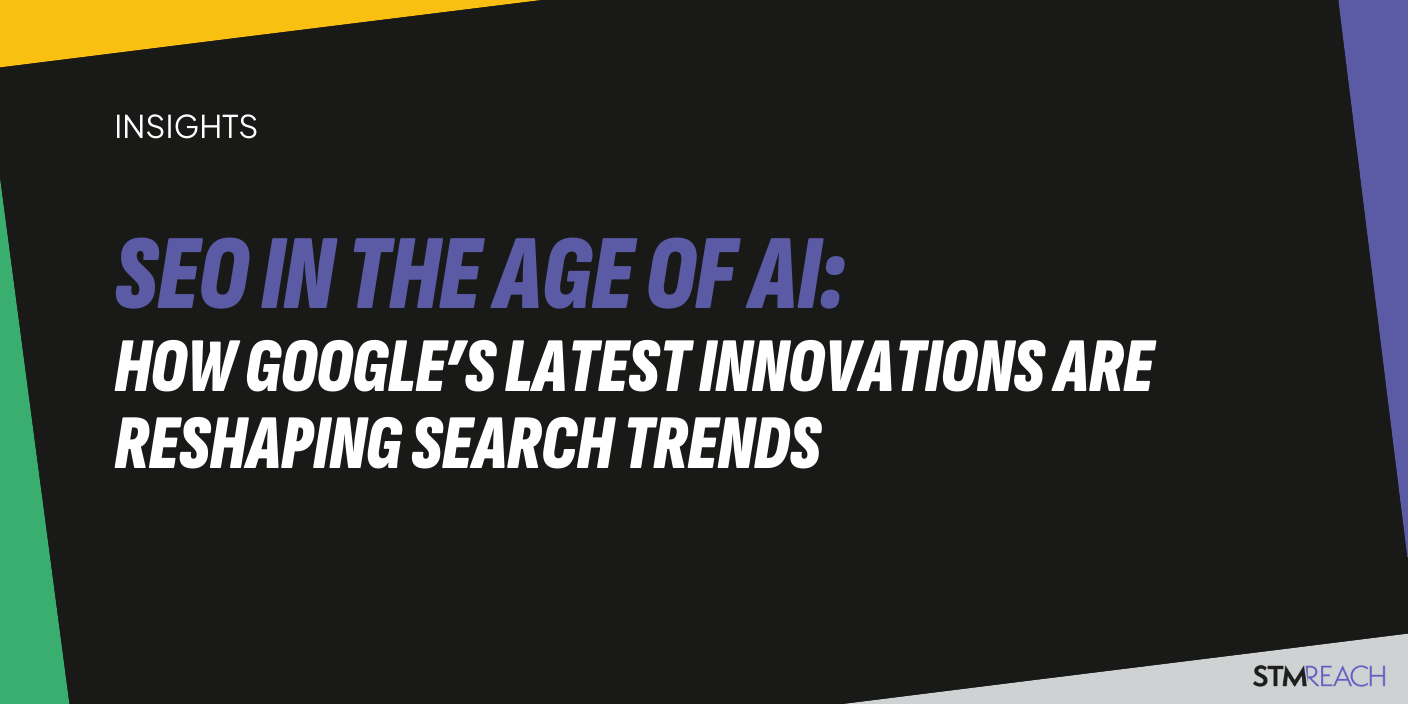SEO in the Age of AI: How Google’s Latest Innovations Are Reshaping Search Trends

STM Agency
Published
27 Mar 2025
The search landscape is undergoing a seismic shift, driven by advancements in AI search and Google's evolving algorithms. Traditional SEO trends and results pages are being impacted by AI-powered search experiences that prioritise natural language processing, predictive search and multimodal search capabilities.
For marketers understanding these Google AI trends is critical to staying visible and competitive in the evolving SERPs.
Evolution of Search (SEO) – A Brief History
Early Days of Search
- 1990: Archie – The first-ever search engine, designed to index FTP sites and help users locate files.
- 1994: Yahoo! – Introduced a human-curated web directory, making it easier to browse the web.
- 1996: Alta Vista – The first major full-text web search engine, allowing users to search entire web pages rather than just directory listings.
- 1997: Ask Jeeves – Pioneered natural language processing in search, allowing users to ask full questions instead of using keywords.
- 1998: Google – The launch of PageRank, an algorithm that ranked web pages based on backlinks and relevance, laying the foundation for modern SEO.
The Rise of Algorithmic Search
- 2000: Google AdWords – Introduced paid search results, allowing businesses to bid for visibility in search engine results pages (SERPs).
- 2001: Wikipedia – Emerged as a major knowledge source, influencing search engines to prioritise reliable, structured information.
- 2003: Google Florida Update – The first major SEO algorithm update, cracking down on keyword stuffing and manipulative ranking tactics.
- 2004-2007: Universal Search – Google began integrating multiple content formats such as images, news, maps, and videos, into search results, significantly changing how users interacted with search.
Mobile & AI Transition Begins
- 2011: Google Panda – The first major AI-driven content quality update, penalising low-quality, duplicate and thin content.
- 2012: Knowledge Graph – Google introduced a deeper understanding of entities and relationships, shifting focus from keywords to contextual meaning.
- 2013: Hummingbird Update – Marked a move towards semantic search, helping Google better understand user intent rather than just matching keywords.
- 2015: RankBrain – Google's first AI-powered ranking algorithm, improving the ability to process complex search queries. This was also the year of the first mobile-friendly update, reinforcing mobile’s growing dominance.
- 2019: BERT Update – Google’s most advanced natural language processing (NLP) update, enhancing its ability to understand the context of words in a sentence. Mobile-first indexing became the default, prioritising mobile versions of websites for ranking.
The AI Search Revolution
- 2022: AI Tools Gain Momentum with the launch of ChatGPT - Tools like ChatGPT and Google’s LAMDA showcased the potential of conversational AI, changing how users interact with search engines.
- 2023: Google AI Overview – Google introduced AI-generated search results (formerly known as Search Generative Experiences - SGE), providing AI-powered answers at the top of search results.
- 2024: AI-Powered Search Engines Emerge – The rise of perplexity AI, GPT Search and other AI-first search platforms, offering alternative search experiences beyond traditional engines like Google.
- 2025 & Beyond: AI Search Reshapes the Landscape – AI is set to further disrupt search, integrating multimodal capabilities including text, voice, image, and video search, and changing how we approach SEO.
Search has evolved from simple keyword-based indexing to AI-driven, intent-based experiences, fundamentally shifting how users find and engage with content.
The AI Search Revolution: A Shift from Keywords to Context
Google has continuously refined its approach to ranking content, moving from simple keyword-based indexing, links and static ranking algorithms to AI-driven search using machine learning, natural language processing and contextual understanding.
This transition has led to:
- More zero-click searches: AI-generated responses answer queries directly, reducing the need for users to visit websites.
- Conversational search experiences: Users are engaging with search in a more natural, question-based way instead if keyword-based queries
- Personalised & predictive search: AI now tailors search results based on a user’s past behaviour and intent.
- Multimodal search: AI enables text, voice, image, and video searches to improve the user experience.
AI Overviews: How Google’s Search Experience Is Changing
One of the most significant recent developments is Google’s AI Overview feature (formerly Search Generative Experience). AI Overviews are auto-generated answers that appear at the top of search results, pulling content from across the web to provide a quick, synthesised response with links to top sources for the information.

Here’s what we know so far:
- 47% of Google search results now contain AI Overviews.
- AI Overviews take up nearly half the screen space on desktop and mobile.
- 60% of AI Overview results come from informational intent searches, compared to just 20% for commercial searches.
- Longer-tail search queries are more likely to generate AI Overview results, as seen in 74% of searches containing 5+ words.
Overall impact - Stats to know:
- Organic traffic has dropped between 18-64% for some sites due to AI Overviews reducing the need for users to click through to web pages.
- Improved quality of clicks from AI Overview. While overall clicks are lower, traffic is more engaged and seeking more detailed information.
- There has been a notable decline in both organic and paid click-through rates (CTRs) as users find answers in AI summaries with one study showing a drop from 1.41% - 0.64%
- Across all AI sources, we are seeing referral traffic increase by up to 8X while still making up a small percentage of overall site traffic.
This shift highlights a growing challenge for brands: fewer organic clicks and a declining click-through rate (CTR) for both paid and organic listings.
AI Search Impact By Industry

- AI Overviews are more prevalent in certain industries such as Health, Safety & Technology.
- Separate studies show AI Overview frequency in health industry searches is around 50%-67%.
- Industries such as eCommerce, Entertainment and Real estate show a low percentage of AI Overview prevalence.
- eCommerce being the lowest of the industry sectors, favouring shopping results and only seeing AI Overview around 7% of the time.
- Shopping Ads are almost never seen together with AI Overviews, when they are, they always appear below the AI Overview.
- Ads appeared from almost a third (28.3%) of all the queries that generated an AI Overview but mainly bottom ads, with only top ads in a handful of queries.
AI Search: Caution & Caveats
- Inaccurate: A recent study across multiple AI search tools found they were inaccurate up to 60% of the time.
- AI search engines are bad a declining to answer when they can't answer correctly, offering incorrect or speculative answers instead.
- More volatile: with 70% of ranking pages in AI Overview change over 2-3 month periods.
- Higher level of competition due to the volatility.
- AI platforms often fail to link back to the correct source either linking to the wrong page, broken URLs or even fabricated sources.
The Impact on SEO and Content Strategy
With AI-generated summaries reshaping search, businesses must reconsider how they optimise for the SERP features. Here’s what SEO strategies should focus on:
1. Informational Search Queries
AI Overviews favour informational content guides, how-tos, and educational resources. Marketers should:
- Optimise content for long-tail queries and natural language searches.
- Focus on E-E-A-T principles (Experience, Expertise, Authority, Trustworthiness) to increase the chances of being featured in AI-generated results.
2. Leverage Structured Data and SERP Features
- 60% of pages appearing in AI Overviews also rank in the top 10 of Google’s organic search results.
- Websites featured in featured snippets, knowledge panels, and People Also Ask sections are more likely to be used as AI Overview sources.
3. Monitor and Adapt to AI-Driven SERPs
Google’s search behaviour is increasingly volatile, with AI Overview rankings changing 70% of the time over a 2-3 month period. Marketers must:
- Regularly track AI Overview presence for their target keywords using tools like Ahrefs.
- Test content formats: FAQs, summaries, and listicles tend to be favoured in AI-generated results.
4. Optimise for Multimodal Search
As Google AI trends shift towards image, video, and voice search, brands should:
- Use image alt-text and video transcripts for better AI indexing.
- Create short-form and long-form video content that aligns with voice and visual search queries.
5. Focus on Brand Trust & Re-evaluate KPIs
With the drop in clicks & CTR from AI generated results, brands must:
- Build brand trust and authority, as AI-powered search engines prioritise reputable sources.
- Evolve from just focusing on click & traffic levels from search, focusing also on search impressions, visibility across the SERPs, engaged traffic and core leads.
Ultimately, the goal of AI-driven search is to enhance the user experience by delivering more efficient, personalised results. However, at this early stage, there are significant accuracy and reliability concerns, with AI-generated responses sometimes providing incorrect or misleading information.
SEO fundamentals remain unchanged businesses should continue focusing on high-quality, user-focused content, strong technical SEO, and optimising for search intent to ensure long-term success.
AI Search - Future predictions
Looking ahead, search trends will continue evolving in these key areas:
- More Personalisation: AI will refine search experiences at a user level, making SEO more intent-driven than ever before.
- Increased uptake in visual and multimodal search: as people get more familiar and search engines and tools improve.
- Expansion of AI Search Engines: Competitors like Perplexity AI, GPT Search, and Grok are challenging Google’s dominance.
- More Engaged (But Lower) Traffic: AI-generated search results may reduce total site traffic but drive higher-quality, more engaged users.
- Bigger focus on brand presence and brand building: Relying on trust and expertise.
- Increased competition for Google: With the continued development and emergence of AI-first search engines.
- (Hopefully) Improvements in the accuracy and reliability of search results from AI platforms.
In Summary: A New SEO Playbook
The rise of AI search means that traditional SEO methods are no longer enough. Instead, brands need to:
✅ Optimise for AI-driven search experiences by focusing on informational content, structured data, and long-tail queries.
✅ Monitor AI-generated results and adapt strategies based on AI Overview trends.
✅ Enhance direct brand engagement through social, email, and first-party content strategies.
As search continues to evolve, brands that embrace AI-driven SEO innovations will stay ahead of the competition ensuring visibility, engagement, and long-term success in the digital landscape.
Want to navigate the impact of AI on search with confidence? Explore our digital marketing and SEO services for tailored insights, strategic guidance, and smart solutions to stay visible online.





